I was recently invited to tour the Stewart Center in Falmouth — an adult day center for people living with dementia. It’s in the former Lunt School on the grounds of OceanView, a large retirement community that also includes the recently opened Legacy Memory Care residence.
The Stewart Center is a collaborative effort between OceanView and the Southern Maine Agency on Aging (SMAA). SMAA has been running another day center — Truslow in Saco — for the past 30 years. During that time they’ve learned a lot, says SMAA’s executive director Larry Gross.
“We used to have a one-size fits all approach,” he explains. “At 10:00 everybody is doing exercises; 10:30 we’re going to do current events; at 11:00 we’re going to do painting. Everybody did the same thing. The state of the art now is that you customize your programming to the interest of members.”
You might think that people with Alzheimer’s and other forms of dementia no longer have any interests, but you’d be wrong. They simply may not be able to say what they are or, in order to do what they enjoy, may need a helping hand. Interestingly, wandering, a common Alzheimer’s trait, sometimes stems from having nothing to do.
“We really try to look at a person from the asset side of things rather than focusing on what’s been lost,” says Larry. “Our members are defining what it is they want to do and staff do their best to make it happen. If you create opportunities for
Alvah Davis remembers when his mother Martha wandered off. She was found safe and sound. Alvah can chuckle now about his new relationship with the Portland Police Department, but he knows their story could have had a different ending.
Martha moved in with Alvah about seven years ago. His kids were in college, so there was some extra room. You usually hear about daughters caring for their mothers at home, not sons.
“My mom and I have always understood each other really well,” Alvah explains. “We’ve always had a good connection. At the time, she was just not managing certain things very well. It seemed like the right thing and it kind of just evolved.”
In the beginning, Martha could be home by herself. Except for occasional business trips, Alvah works from home, which he says makes things easier. He also relies on the support he gets from his children, his brothers and caregivers who come into the home. Now his mother goes to the Stewart Center twice a week and so far, they are both benefiting.
“When she’s at home, she gets bored with me,” he says. “Here, she can come and meet people — she’s a very social person. And I don’t think about her, really until it’s time to pick her up. I’m secure in the knowledge that she’s safe and happy.”
Jane Hurst feels the same way. Five years ago, she left her home in New Hampshire to move in with her mother Dorothy here in Maine. Like Alvah, in the beginning she could leave her mother alone and would drive to NH for an occasional overnight in her own bed.
“I don’t see it much now,” Jane says. “In the course of five years there’s been some huge changes in her and what she can do and it was no longer a good idea to leave her. Once she’s here it’s like heaven to me because I know she’s in very good hands and I don’t have to think about a thing. I don’t have to think about her toileting needs, I don’t need to think about whether her clothes need to be put on or off, whether she’s getting something to eat or if she’s appropriately engaged or sitting in total boredom.”
The first day Dorothy went to the Stewart Center, Jane went back to the house and did absolutely nothing. “I just sat there and thought, Whoa, what are you going to do with all this time? The second time I sat down and played the piano for the first time in about seven years.”
Dorothy doesn’t even recognize Jane as her daughter anymore. “Nobody understands,” says Jane. “I’m not a poor me kind of person, so don’t misunderstand where I’m coming from, but nobody understands until they have actually done it themselves.”
Howsie Stewart understands. Her husband Tim was diagnosed with frontal lobe dementia five years ago and she tried to care for him at home. Their daughter Polly Bradley is SMAA’s director of day services and her perspective of her parents’ situation as his disease progressed was both professional and personal.
“We always knew that Dad was fine,” she says. “He had professional caregivers and his daughters and my mom helping. We were more concerned about my mom. She was tired and stressed and to the point where she could not physically care for him.”
Polly and her two sisters finally convinced their mother that things couldn’t stay the way they were anymore. Tim and Howsie moved into a retirement cottage at OceanView and when Legacy Memory Care opened, that became Tim’s home. Right next door is the Stewart Day Center. The name is not a coincidence.
Tim and Howsie Stewart are well-known for giving back to their community. For many years, Howsie was on SMAA’s board, some of them as president. When she stepped down, she stuck around, helping out whenever and wherever she could. Knowing that it would take some generous donations to make the Stewart Center a reality, Larry decided to approach Howsie and the answer was yes.
“It spoke to me,” she says. “This is something very personally happening to me and I knew he wasn’t going to get better. You know it’s not going to change.”
Everything at the Center, from the colors to the layout and floor plan to pictures on the wall was carefully designed using the latest research regarding how people with dementia respond to their environment.
“We looked at what was considered state-of-the-art in physical design and programming,” says Larry.
In a way, the Stewart Center, which opened last October, is a mini version of a larger project now underway. Next fall, SMAA plans to open a brand new free-standing adult day center in Biddeford that will replace Truslow.
“We have an opportunity to use [the Stewart Center] as a little bit of a laboratory, Larry explains. “OK, how did that idea work out, etc. So far, it’s not really an experiment in the traditional sense, but a real positive experience.”
Positive for the Stewarts.
“I see the benefits every day,” Howsie says, “when I talk to people who tell me how much they love being there. I love the art room and seeing what they’ve made and seeing people who are content and happy in a beautiful environment.”
Positive for Jane and Alvah and their mothers.
Jane: “Once she’s here, I think the quality of her life is hundreds of times better. Even if she just sits in a corner and watches all the other people, it’s better than sitting [at home] in her favorite chair in her favorite living room. There just isn’t anything there for her.”
Alvah: “One important thing is if going to the Stewart Center weren’t working for my mom it wouldn’t be working for me either. I really think it’s kind of like a miracle drug in a sense. When I pick her up she’s smiling and that carries through the rest of the day.”
You’re not alone
Millions of Americans have Alzheimer’s or some other form of dementia. As baby boomers age, the number of cases is expected to escalate. According to the Alzheimer’s Association, “When the first wave of baby boomers reaches age 85 (in 2031), it is projected that more than 3 million people age 85 and older will have Alzheimer’s.”
Family members like Alvah and Jane and Howsie usually provide most of the care — often while they are also trying to hold down a job and run their own households. Studies have documented the toll it can take — depression, anxiety and other serious medical problems.
It’s common to feel as if you’re alone and that, as Jane said, no one understands. Howsie says she felt as if she had no one to talk to because they didn’t know anyone else dealing with dementia.
Alvah offers this advice:
“I would say to everyone who’s in this situation — men and women alike — go find out what’s available and give it a try. I can almost guarantee their lives will change by finding the resources that are out there.”
If you would like to learn more about dementia resources in Maine or about the Stewart Center, visit the Southern Maine Agency on Aging website or give them a call at 1.800.427.7411.
If you have a resource that you can recommend to other caregivers, please feel free to share it in the comment section below.


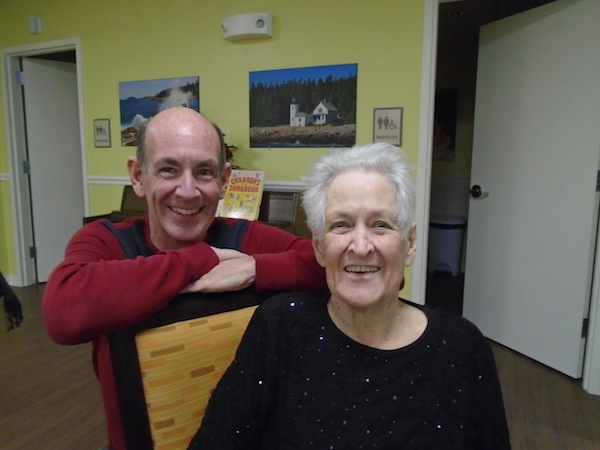
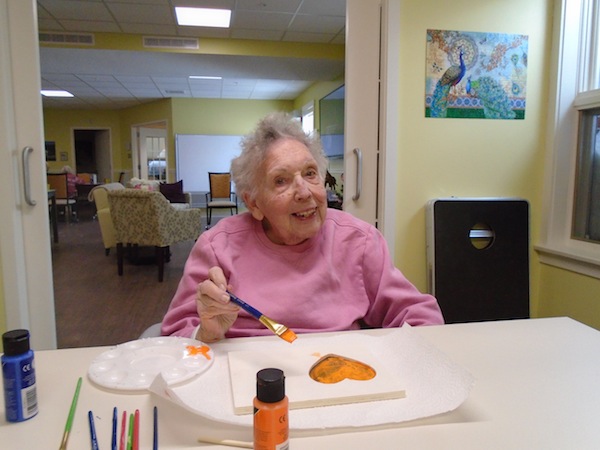
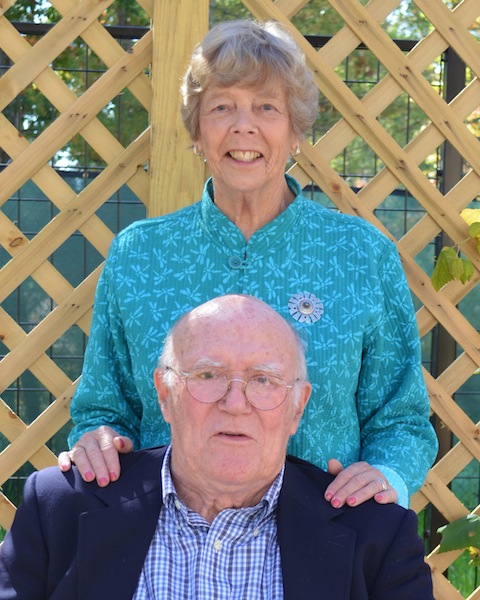
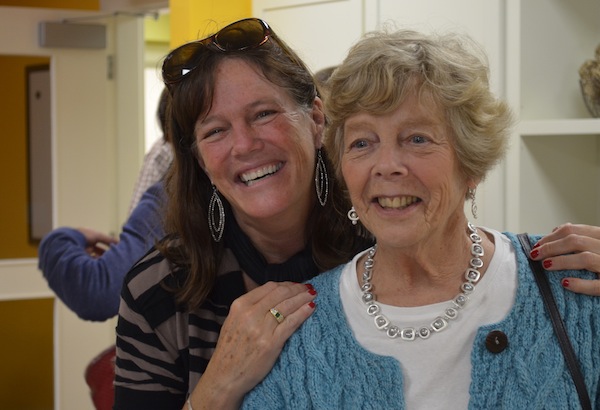
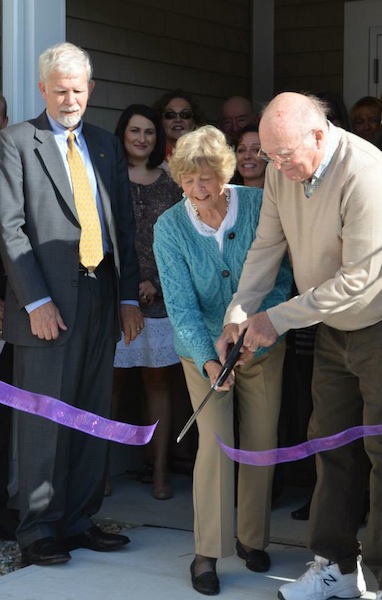
Nice story, Diane. It underscores the need for more places like this as we boomers age.